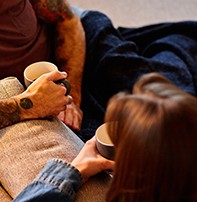Managing your withdrawal from alcohol at home
This handout provides information about withdrawing from alcohol at home.
Many alcohol-dependent people can safely undergo withdrawal from alcohol (‘detoxification’) at home if they are supervised by their GP. Taking the drug diazepam assists with the symptoms of alcohol withdrawal. For the patient’s safety, diazepam is usually dispensed daily by a pharmacist or practice nurse.
This patient handout contains important reminders of what your GP would have already discussed with you when they suggested that detoxification at home would be appropriate for you.
If you get withdrawal symptoms in the first week after you stop drinking (e.g. the shakes, bad sleep), diazepam can help these. When properly supervised by a doctor or nurse, diazepam can make withdrawal safer and easier. It is only used for the first week. If you use it longer, then there is a risk that you could become addicted to it.
It is important to follow the instructions below to avoid harms from using diazepam, such as injury. Your doctor also may organise for you to pick up the diazepam once a day.
On the next page, the charts show examples of the maximum dose that you may need to manage your withdrawal symptoms. Your doctor can pick which schedule (‘regimen’; Regimen 1, Regimen 2 or Regimen 3) is best for you.
Some people need less medication. Other people find that this dose does not keep their symptoms under control, and their doctor may increase the dose. Sometimes the doctor will advise a person to go to hospital if their withdrawal is severe.
Instructions
- Do not take the diazepam if it is making you drowsy
- Do not take diazepam if you have been drinking that day
- Do not drive or use machinery while taking diazepam (or if you are shaky from withdrawal) and be careful when crossing roads
- If your withdrawal is getting worse (e.g. shakes, sweats increasing) come back to see the doctor or go to the Emergency Department
- Keep diazepam out of reach of children
- Do not give your medicine to anyone else: a dose that may be safe for you may be dangerous for someone else
- Stop the diazepam within a week, so that you do not become dependent on it (addicted).
Your doctor will tell you which of the regimens you should use; or the doctor may design a different treatment plan for you (see relevant information for the doctor and for the patient).
Remember, if you feel drowsy (sleepy by day) then do not take the diazepam. MT


